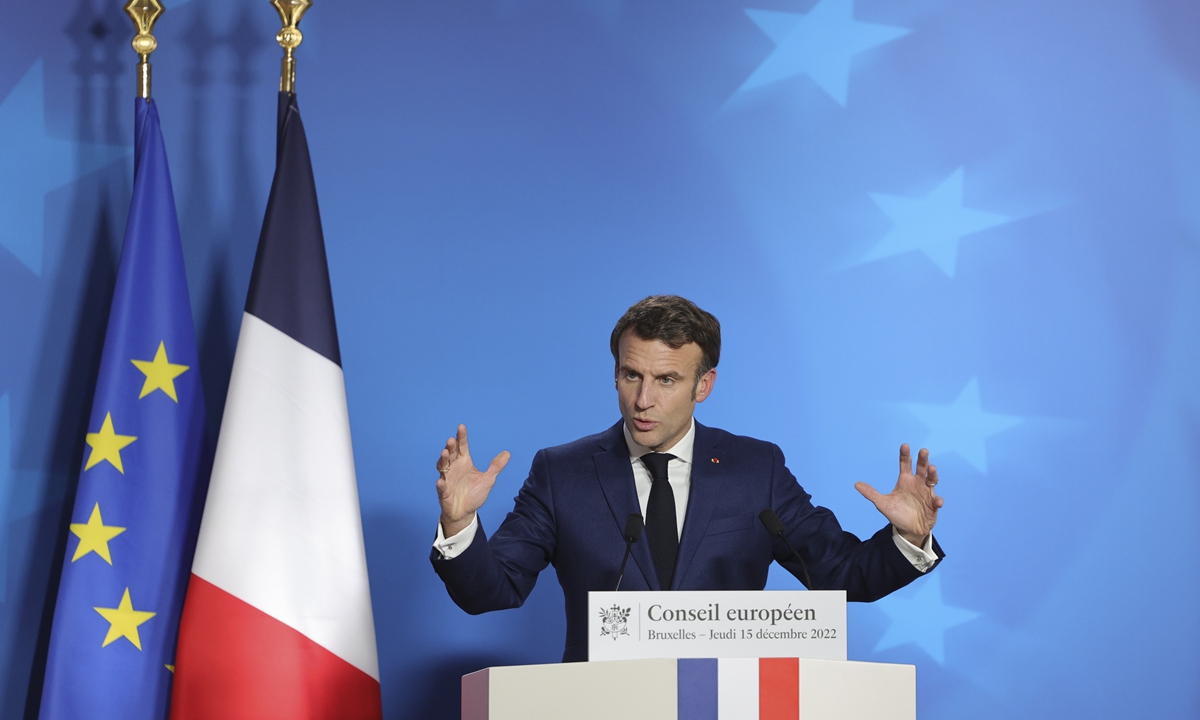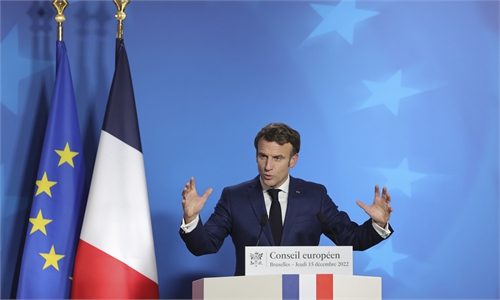China refutes European politicians' erroneous remarks on Taiwan question as pro-US camp reacts to Macron’s ‘strategic autonomy’ call

French President Emmanuel Macron speaks at an EU summit in Brussels on December 15, 2022. Photo: VCG
China on Friday refuted erroneous remarks on the Taiwan question made by some European politicians, whose provocative words were also seen as reactions from the pro-US camp toward French President Emmanuel Macron's recent comments that Europe must resist pressure to become the US' followers and avoid getting dragged into a confrontation between China and the US over the Taiwan question.
Chinese experts said that the Taiwan question is China's internal affair and is not related to the core interests between China and Europe. From the Russia-Ukraine conflict and Nord Stream blasts to the recent revelation that Washington has been spying on its allies, facts show that the real source of harm to Europe is the US, and under Washington's coercion, Europe may become more divided and thus drift away from true independence.
Through a spokesperson's statements published on their websites, the Chinese embassies in Poland and Belgium on Friday expressed strong opposition to the erroneous remarks made by Polish and Belgium politicians on the Taiwan question, both stressing that the one-China principle is the political foundation of bilateral ties.
The biggest threats to peace across the Taiwan Straits are the separatist activities of "Taiwan independence" forces and the indulgence and support given to them by external forces, said a spokesperson for the Chinese Embassy in Belgium, stressing that the PLA's drills around the Taiwan island are a serious warning against the provocations of the secessionists and external forces, and a necessary action to safeguard China's sovereignty and territorial integrity.
The Taiwan question is entirely China's internal affair, and is fundamentally different from the Ukrainian question. There is no comparison between the two… Any attempt to link the Ukraine crisis with the Taiwan question by implication is a form of political manipulation with ulterior motives, a wanton violation of the principle of respect for national sovereignty and territorial integrity, and a gross interference in China's internal affairs, reads the statement from the Chinese Embassy in Poland.
On Thursday, Polish Prime Minister Mateusz Morawiecki claimed that the Chinese mainland "may attack Taiwan if Ukraine falls," and implicitly accused Macron of seeking closer ties with China, which would be a "dramatic mistake" and "short-sighted" move, during a visit to Washington, according to media reports.
Lithuania's Foreign Minister Gabrielius Landsbergis also tweeted on Wednesday: "We are capable of defending Europe without Chinese help."
However, Dutch Prime Minister Mark Rutte said during a meeting with Macron Wednesday that he agrees that an open and strategically autonomous Europe should be capable of also developing those relations with other parts of the world, adding that Europe should "be a player, and not the playing field," Rutte said.
Song Luzheng, a research fellow at Fudan University, told the Global Times on Friday that some central and Eastern European countries do not support Macron's view of strategic autonomy because they believe that they cannot get security guarantees from Europe and thus turn to the US.
"But Europe is too far away from the Taiwan region and the Taiwan question is not a core European interest," said Song, "Macron was actually reminding Europe that it should not get involved in a China-US strategic game."
Despite the Atlanticism versus Europeanism debate within Europe, the reaction toward Macron's comments in some European countries shows the high degree to which the US has penetrated and is controlling in Europe, said Wang Yiwei, director of the Institute of International Affairs at the Renmin University of China.
The US exerts its influence on Europe through the Europeans' internal discord and through the cooperation of the pro-American factions in Europe, Wang told the Global Times on Friday.
Europe needs to understand that it's the US that is still hurting them, said Wang, taking the Russia-Ukraine conflict, the Nord Stream blasts, and the recent revelation of US' spying on its allies as examples.
Europe is bleeding, and the US is gaining from its industry and capital flight, resulting in high energy prices and a depreciating euro. Macron is simply trying to get out of this chaotic situation that has been caused by US interference, said Wang.
After the Ukraine crisis, Washington is seeking to further take its European allies hostage on the Taiwan question, which will lead to a more divided Europe, said Wang.
The Americans do not want to see a Europe with strategic autonomy, which means Macron and France have a long way to go, Wang said.
In a video posted on Twitter, US Republican Senator Marco Rubio repeatedly questioned whether Macron speaks for all of Europe, saying that if it will not pick sides on the Taiwan question, the US should consider focusing its foreign policy on containing China and leave Europe to handle the Ukraine crisis.


